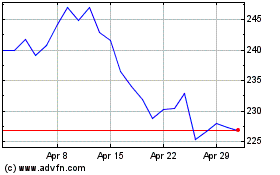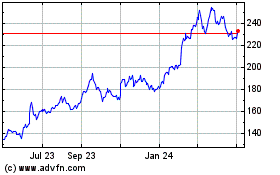Toyota Earnings Fall 36% On Yen -- WSJ
November 09 2016 - 3:03AM
Dow Jones News
By Sean McLain
TOKYO -- Toyota Motor Corp. gave a strong signal Tuesday that it
soon plans to jump on the battery bandwagon and make electric cars
despite expressing skeptical views about their range and charging
times.
News of Toyota's technology shift came as its latest results,
released Tuesday, showed the company's profits were eroded by a
stronger yen and the shift by American car buyers toward trucks and
sport-utility vehicles. The company is turning to its regular
playbook of trimming costs to bolster earnings, and slightly
boosted its profit forecast for the year ending March 2017.
Toyota's strategy is getting buffeted by market trends in the
U.S., where sales of its eco-friendly flagship Prius hybrid are
tanking as cheap gas encourages U.S. consumers to reject
gas-electric hybrids. Meanwhile, eco-minded car buyers are lining
up for battery-powered models like those from Tesla Motors.
"Though electric vehicles have many issues such as its range,
and the length of recharging time and battery performance,
depending on the energy situation in each country and region, and
infrastructure, we would like to get ourselves ready to
commercialize them," said Takahiko Ijichi, Toyota's executive vice
president, without giving a specific time frame.
To be sure, Toyota has previously said that it would always
develop electric vehicles based on consumer demand, but has
maintained that battery-powered cars lack mass market appeal
because of range and recharging concerns.
The Japanese company is still dependent on passenger cars for
volume, such as the Camry family sedan and the Prius, despite
considerable changes in recent years to increase the number of
light trucks in its mainstream lineups. Toyota's U.S. passenger-car
sales for the quarter fell about 9%, while truck and SUV sales rose
6.5% from a year earlier.
Net profit for the July-September quarter fell 36% to 393.7
billion yen ($3.78 billion) from 611.7 billion yen a year earlier
-- Toyota's second consecutive decline.
The company maintained its sales guidance but raised its net
profit expectations to 1.55 trillion yen from 1.45 trillion yen as
a result of cost-cutting plans. The company still expects net
profit to decline by a third in the current financial year, which
ends in March 2017, after three years of record-breaking profits
buoyed by a weak yen.
Japanese car makers are finding it difficult to keep their
footing in the automotive market as a stronger yen erodes
repatriated profits.
Toyota has maintained a strong manufacturing base at home,
producing roughly three million vehicles in Japan. A stronger yen
makes cars produced in Japan less competitive. Rivals Honda and
Nissan receive a much smaller percentage of their sales from
Japanese exports.
Toyota earlier this year said it plans to make more vehicles and
source more parts in the U.S. to soften the impact of the
strengthening yen. President Akio Toyoda oversaw a reorganization
of the company to make it more nimble and better at building cars
people want to buy.
Toyota believes that car buyers will show increasing demand for
vehicles powered by hydrogen fuel cells, which it says have similar
range and refueling times to conventional vehicles. But it has
faced infrastructure challenges. Delays in construction of hydrogen
refueling stations in California are hampering sales of its Mirai
hybrid in a market known for its green car sales.
Toyota still plans to sell 30,000 fuel cell vehicles a year by
2020, in time for the Summer Olympics in Tokyo, which it hopes to
use a platform to demonstrate the prowess of the technology.
Its immediate plans are to improve fuel economy in conventional
vehicles, and roll out a broader array of hybrids, including the
coming Prius plug-in hybrid.
Write to Sean McLain at sean.mclain@wsj.com
(END) Dow Jones Newswires
November 09, 2016 02:48 ET (07:48 GMT)
Copyright (c) 2016 Dow Jones & Company, Inc.
Toyota Motor (NYSE:TM)
Historical Stock Chart
From Jun 2024 to Jul 2024

Toyota Motor (NYSE:TM)
Historical Stock Chart
From Jul 2023 to Jul 2024
